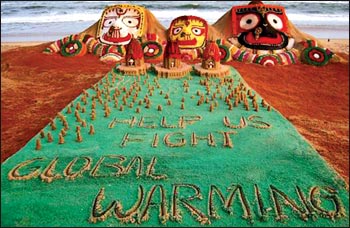National security heats up
The British statesman Lord Salisbury famously warned that ‘if you
believe the doctors, nothing is wholesome; if you believe the
theologians, nothing is innocent; if you believe the soldiers, nothing
is safe’.
I was reminded of Salisbury’s comment when I read the Times’ story on
a recent study of the national security implications of climate change.
So I went online and read the actual report (by CNA Corporation, a DoD-funded
think tank).
|

Help fight Global Warming |
It concludes that ‘climate change poses a serious threat to America’s
national security’, describes it as a ‘threat multiplier for instability
in some of the most volatile regions of the world’, and recommends
integrating the national security consequences of climate change into
existing defense and national security strategies (along with a number
of other measures).
This is a bit of a ‘dog bites man’ story, of course, when was the
last time a DoD study concluded that some new global development was
leaving us more secure? But as Salisbury cautioned, we need to take such
warnings with a ‘very large admixture of insipid common sense’.
If the purpose of the study is to highlight the need to take climate
change seriously and to rally public support for doing something about
it, then OK. The Times quotes retired general Anthony Zinni in this
fashion, where he warns that we will either spend the money now to try
to slow or halt climate change, or we will spend the money (and lives)
later to deal with the consequences.
This is a familiar political tactic: When you want to do something
expensive, try to convince people that it is a critical national
security imperative. That’s one of the ways we got the Dwight D.
Eisenhower National System of Interstate and Defense Highways, (a.k.a.
the Interstate Highway System) back in the 1950s, it was justified as a
critical element in our national defense infrastructure.
Similarly, there’s no question that climate change could affect
certain defense operations. For example, rising sea levels could affect
access to overseas bases like Diego Garcia, and affect operations at key
US naval bases here at home. So there’s clearly good reason for DoD to
think about these issues and start planning ahead.
But as Matt Yglesias noted yesterday, the CNA study reads like an
exercise in threat-inflation (he called it ‘hubristic imperialism’). It
is entirely possible that climate change could provoke major refugee
movements in certain areas (eg, Bangladesh), and that such a development
could have powerful effects on neighboring countries (e.g., India). But
instead of immediately concluding that, American interests are at stake,
isn’t this first and foremost India’s problem?
And if the United States starts devoting a lot of time and attention
to figuring out how to mitigate such developments won’t that reduce
India’s incentive to reach a meaningful climate change agreement?
Climate change might also foster instability in various ‘volatile
areas’, but it does not immediately follow from that observation that US
interests will necessarily be affected in any significant way. Overall,
the CNA study illustrates what might be called the Albright Doctrine:
“Because we are the indispensable power, every global problem has to
have an American solution”. But the more closely you look at the report,
the clearer it is that the actual national security implications of
climate change are modest, at least for the United States.
The likely demands on US military forces will be for humanitarian
relief, not for the protection of vital US interests. I have no problem
with humanitarian relief, by the way, but let’s call it what it is, a
form of global philanthropy, and not try to sell it as a defense of the
American people. Courtesy Foreign Policy |



